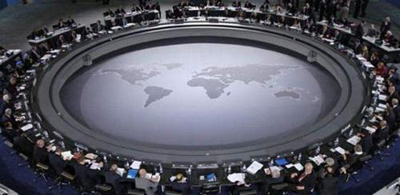The 'Threat Board' Is Looking Busy
Bill Blain

“I don’t suppose it’s anything.. Are we expecting any planes from the East this morning?”
Markets are digesting what’s been a fascinating week in terms of swings, tensions and threats. Everything from Supply Chains, Taper and Inflation is on the radar as speculative assets swing widely. Maybe it’s time to sit back, step away and take time to consider the macro issues of recovery, and the micro issues about how the pandemic has altered behaviours. The UK’s bounce bank loans could highlight how the world has changed as massive defaults are expected.
That was an interesting week for markets. It’s little wonder it all feels a bit wobbly. What did we learn? At the macro level there are many things beginning to crystalise;
-
There is a clear inflation threat.
-
Expectations are torn between a massive boom on the back of infrastructure and climate-change spending, versus the possibility the pandemic recovery proves transitory and could quickly stall.
-
There is a clear danger of “Taper”; central banks bringing forward plans to scale back QE bond purchases and allow interest rates to move higher – normalising the economy.
-
We’ve seen a sharp rotation out of ‘disruptive innovation’ stocks into fundamentals and areas like renewables.
-
We’ve got potential destabilisation of market confidence as the highly speculative and hope-driven tulip markets in cryptocurrencies and SPACS look to implode.
It’s little wonder we’re seeing a lack of appetite for new risk across the market – although the Oatly IPO did well. Many investors are choosing to step back, watch and wait and see how this will play out. What’s the point piling into stocks when the market momentum has stalled? Why rush into markets that seem to have run out of steam? Better idea might be to pause, wait and see what happens and what emerges from the ruin of speculative gambling memes, stocks, and fake currencies.
May is traditionally a time for market participants to step back, take stock, take a deep breath, and try to do some serious analysis figuring out STUFF… Like:
-
Which disruptive tech stocks are founded in nonsense, and which are genuine opportunities?
-
Which ones are well managed with deep defensible moats and weed out the opportunists will zero futures?
-
What are the implications for post-pandemic growth from supply-chain breakdowns in everything from cement to micro-chips?
-
What are the long-term implications of greatly increased government debt of economic activity?
However, it’s also time to dive deep into the micro-aspects of the global economy to figure out a key metric;
We’re all very aware of the damage done to people by lockdown, to their hopes, expectations, relationships, and their finances. For every person that apparently saved money during pandemic, there is little talk about the millions of workers who lost out, and their long-term prospects. I’ve a young friend who flies Dreamliners. He was made redundant, and took a job delivering groceries. He had to find the money to keep his qualifications up to date on the simulator. Now he’s waiting in line as airlines start to slowly rehire. That’s challenging in terms of the reserves of resilience he’s showing his wife and new baby – its tough. Really tough.
I’ve spotted two distinct trends through the past 16 months of pandemic. In our village everyone is friendlier and willing to help each other. But outside, I’ve noticed frustration and fury everywhere – like the guy who drove his car into my chum on his bike, ‘cycling too slow’ he said when arrested. Or the fist fight in the queue to get into B&Q. Or the belief that anything goes – why bother with social mores anymore..
Let me try to explain one aspect of that. When I was young, businesses going bust was not an option. It would destroy reputations. Today.. less so.
There is trouble brewing for British Banks. Chatting to a very well-connected bank manager y’day he told me tales of hair-raising abuse of the government’s Bounce Back Loans (BBLs). These were launched in the early stage of the Pandemic to allow SME’s to borrow funds at ultra-low rates to see them through the period of economic dislocation; 2.5% interest, first 12 months for free.
The banks are not at any immediate risk – the UK’s HMRC is standing security on the loans. But the banks will be expected to chase up defaulted loans. HMRC simply suggests to the lenders that they pursue any loan default via their normal methods, which would include threatening letters, statutory demands, and potentially court action and baliffs. “Whether or not the lenders will find this practical or possible to enforce over such a projected volume of defaults remains to be seen” says a company debt advice site.
There is no personal liability via personal guarantees on the BBLs, but if they have been raised by companies knowing they are insolvent, or to pay off personal loans or other guarantees, or the loan has been otherwise “abused”, then the banks will be expected to chase the borrowers.
The obvious way out for SME owners finding themselves swamped by the costs of the pandemic, the lost business, keeping up payments on previous loans and leases, is to declare themselves insolvent. The question is – just how many genuine honest companies will, and how many SMEs will have fraudulently abused the loans? And how many firms will now see insolvency as a costless exit?
My bank manager chum was telling me of BBLs taken out in March where the owner has already transferred all the cash out the business into personal accounts and declared insolvency. He said loan officers are being stonewalled when they ask about repayment plans – SME owners figuring that if everyone is defaulting, then the banks can’t chase them all..
The problem for banks will be knock-on. If firms default on BBLs, and declare insolvency then the problem cascades across all loans – crashing the credit quality of bank lending books. “There are hundreds of firms we expect will just give up…” he told me – talking about his small region. The micro issue of a host of SMEs collapsing has enormous consequences up the chain for employment and growth.
At the macro-level there are clear business and market risks, but if the pandemic has also impacted behaviours at the micro level and change how investors and entrepreneurs view responsibility – what does that mean for the future?
 Bill Blain is Strategist for Shard Capital, a leading investment firm. Bill Blain is Strategist for Shard Capital, a leading investment firm.
Bill is a well known broadcaster and commentator, with over 30-years experience working for leading investment banks and brokerages at senior levels. He's been closely involved in the growth and development of the global fixed income markets, and pioneered complex financial products including capital, asset-backed securities and private placements. Increasingly, he's been involved in Real and Alternative Assets looking to explain their complexity and create liquidity in them.
Bill is a passionate sailor, talentless painter, plays guitar badly, is learning the bagpipes, and built a train-set in his attic.
He is a regular speaker on HoweStreet.com, and the FinancialSurvivorNetwork radio shows. Chris was also featured on the cover of AmalgaTrader Magazine, and contributes articles to several financial hubs like MoneyShow.com.
morningporridge.com
| 



